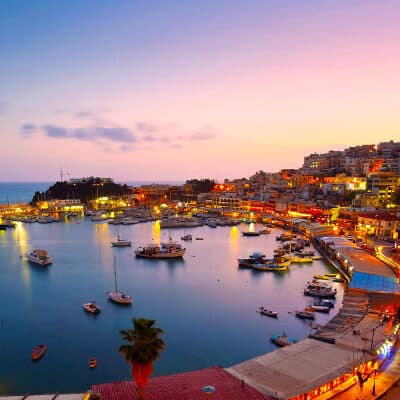Greece in numbers
- Continent: Europe
- Population: 10,709,606 (2020)
- Population growth: -0.14%/year
- Area: 132,049 km²
- Density: 81.10 inhabitants / km²
- GDP growth: 5.90% / year (2022)
- Official languages: Greek (French and English often spoken)
- Currency: Euro (€ EUR)
- Type of State: Parliamentary Republic
- Tourists: 27,194,000 people/year
Greece is a country located in Southern Europe and is a member of the European Union.
It shares borders with Albania, Macedonia, Bulgaria and Turkey. The Ionian Sea to the West, the Aegean Sea to the East and parts of the Mediterranean Sea, frame the country, one-fifth of whose territory is made up of more than 9,000 islands and islets, of which about 200 are inhabited.
80% of the country is made up of mountains, the highest of which is the renowned Mount Olympus (2,904 meters).
Due to its proximity to Turkey and North Africa, parts of Greece have been affected by the transit of immigrants seeking access to the European Union.
Greece has seen its population decrease slightly, by -1.4% in total over the past twelve years and the population of the Athens area, fell to 3.7 million in 2019.
Our selection in this country
Very large works were undertaken for the 2004 Olympic Games, in order to modernise the infrastructure with road and rail transport, and sports facilities receiving most of the investment.
Following the Covid pandemic, the EU has agreed to grant Greece approximately €30 billion from the European Recovery and Resilience Plan. It is estimated that this will result in an increase in real GDP of 7% by 2026 with the creation of 180,000 new jobs.
Greece suffered badly in the 2014 financial crisis but emerged with a GDP Growth of 5.9% in 2022 after the COVID pandemic. According to IMF estimates, this is however expected to slow to 1.2% this year amid deteriorating global economic conditions. Inflation has however dropped to 4.6% in the latest quarter.
Real estate investment areas
Athens/Piraeus/Attica
- infrastructures: Athens international airport, domestic flights and regular ferries to and from the port of Piraeus
- culture, tourism, well-being
- 6.3 million tourists/year
- very attractive and booming economic region
The Cyclades – over 200 islands starting with Mykonos, Santorini and Kea…
- infrastructure: some international airports,
- ferries: reliable ferry service to the smaller islands
- water sports and golf very present
- charms and proximity of the islands in the cyclades
- mediterranean climate
Real estate market in Greece
Greek property prices stand at just over €2,000/m² at the end of 2022, up 11% year-on-year. Increases in property prices have gathered momentum over the past five years, but they are still far (more than 20% below) from their pre-crisis levels of 2008-2011.
You can thus find magnificent villas by the sea, both in mainland Greece and on the country’s islands, at attractive prices which are much more affordable than in France or Italy for example.
For several years the country has attracted investors from all over Europe as well as from the United States and the Middle East, who have also succumbed to the charms of the country and its exceptional real estate.
This trend is expected to continue in 2023 with a record number of foreign investors looking to take advantage of the low property prices in Greece.
Return on Investment
Rental yields: three-bedroom flats in Athens are able to achieve a 4% return; small apartments offer higher returns and, in the suburbs, apartments can achieve returns of 4.5%.
Investors looking for higher returns should consider small islands: properties on Mykonos were producing an 8% return in 2018, Santorini and Paros around 6.5%. In Rhodes and Porto Heli, yields above 5% are still available, easily beating yields in other Mediterranean destinations such as Marbella, the French Riviera or the Balearic Islands.
The Greek government has recently taken several measures to revive the real estate market. The 24% value added tax on new buildings has been suspended for three years and tax breaks of up to 40% for renovation costs have been announced.
Evolution of property prices in Greece
In February 2023, residential properties for sale on the market were at an average of €2,292 per square meter representing an increase of 13.41% compared to February 2022 (€2,021/m²).
On the rental market, in February 2023 properties were available at an average rental of €8.90 per month per square meter, reflecting an increase of 18.98% compared to February 2022.
Steps to buying a property in Greece
Step 1. Obtain an AFM number (i.e. Tax Identification Number or TIN)
The first step is to obtain a Greek tax number (AFM) from the Internal Revenue Services. You must provide proof of address (usually a copy of a utility bill is sufficient), a certified copy of your passport (certification can be done by a Greek lawyer) and a Power of Attorney (apostilled) appointing a tax representative (usually a Greek lawyer) to obtain this number.
It is necessary to have an AFM in order to open a bank account with a local bank. You will need a local bank account to pay various fees incurred during the process.
Step 2. A bank loan
If you wish to acquire a property in Greece, it is now possible to take out a mortgage loan with a limited number of local banks. An alternative is to take out a loan in your country secured against an existing property, and transfer the sum necessary for the acquisition to a bank account in Greece.
Step 3. The Preliminary Contract
When you have reached an agreement with the seller for the acquisition of his property, you must pay a security deposit of 10% of the purchase price when signing the Preliminary Contract. This sum is held in a segregated account of the lawyer in Greece until the signature of the Deed of Sale.
The law concerning real estate in Greece is controlled by the Greek Civil Code (Astikos Kodikas), it is very important that you are represented by an independent lawyer who will carry out the necessary due diligence with regard to the title and the status of all planning approvals for the property.
If our lawyers identify undeclared defects on your property, you can withdraw from the sale and recover your security deposit.
Step 4. Deed of Sale
The local notary (Simvoliographo) checks all the documents to ensure they comply with the law and prepares the Deed of Sale which is signed in his presence.
The notary represents the State and does not offer advice to any of the parties.
The following taxes and charges are required to be paid before the execution of the Deed of Sale:
– Property transfer tax (FMA) of 3.09% is payable on all real estate purchases and is calculated on the “objective value” of the property.
– Notary and registration fees: 2%.
– Lawyer’s fees: approximately 1.5%
– Estate agent fees – these are usually shared between the seller and the buyer and would typically be 4% of the sale price.
If you wish to obtain a detailed estimate of the costs and charges, relating to your proposed investment, please contact us
Pitfalls to avoid when buying a property in Greece
1. The Greek authorities established their Land Registry or Cadastre (Ktimatologio), where the title to property and all charges, liens and foreclosures are required to be registered. However, parts of the country have not yet fully implemented the system, so it is important to make sure that your lawyer carries out all searches in the area where you wish to buy your property and verify that it has, if required, been fully registered. Where the system has not been fully implemented, it is also necessary to do a search in the local Mortgage Office (Hypothykophylakeeo) where a charge may have been registered against a person as opposed to a property.
2. It is obviously important to check local planning regulations and any planning approvals that have been granted.
3. Given Greece’s ancient history, it is important to check If land or the house you are buying is located close to any areas of archaeological interest.
4. If the land or property is located in a forestry area, on the coastline, close to a national border or in an area of outstanding natural beauty, you need to check whether any special permits are required.
5. Particularly if the property you are looking at is unfinished, you should appoint an engineer or surveyor to carry out a technical survey to ensure that the building complies with the planning and building regulations and any topographic plans. A buyer should also receive an Energy Performance Certificate.
6. Under Greek law, any change or transfer of property ownership is prohibited if any illegal building or infrastructure exists on the property; the owner can apply to have the property legalised on payment of a fine.
7. You are advised to be cautious of local real estate agents on the islands. Do not sign anything they may present to you before an independent lawyer has had a chance to review the document in question.
8. As mentioned below, it is necessary to obtain a Greek Tax File Number and if you remain resident outside Greece for tax purposes, the Greek Tax Authority require a name and address of a person resident in Greece to correspond with. In this case, you would need to appoint a qualified tax accountant to act as your [tax] agent.













